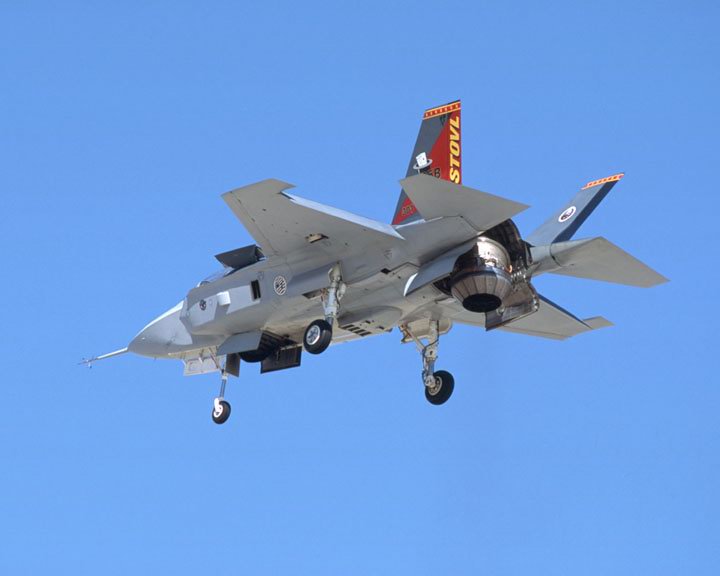One Transatlantic Spat Closer to European Independence
Is Washington mistreating its European allies by cutting British Aerospace out of the Joint Strike Fighter program? According to this op-ed article from France's Le Figaro, Europeans should get the message from this latest insult, and focus on the 'strategic independence of our continent.'
By Alexandre Adler 
Translated By Pascaline Jay
March 23, 2006
Le Figaro - Home Page (French)

 The F-35 Joint Strike Fighter is a Military Fighter Aircraft
The F-35 Joint Strike Fighter is a Military Fighter Aircraft
Designed By The United States and The United Kingdom.
It is Intended To Replace the Current Generation of Strike
Fighters. There are Three Levels of International Participation
in the Project, with the British Alone in Level One.
[ Joint Strike Fighter]
Joint Strike Fighter]
[CLICKABLE PHOTO BELOW]

.JPG) The British-Designed Thrust Vector Engine, which Allows
The British-Designed Thrust Vector Engine, which Allows
the JSF to Fly Vertically and Horizontally. (above);
A JSF Prototype Takes Off
Like a Helicopter - Straight Up. (Below)

 Diagram Represents the Surviveablity of the JSF. (above)
Diagram Represents the Surviveablity of the JSF. (above)


Let's commence with the symptom, which seems so obvious that up to
the present, it hadn't sparked the analysis that it deserves. The United States,
through the will of the Pentagon, has purely and simply dismissed their
British, as well as their Dutch, Danish, Norwegian, Italian and Turkish
partners, from the next step in a program to build a new fighter-bomber, the "Joint
Strike Fighter," JSF.
Initially conceived for the U.S. Air Force and Navy, the JSF was
rapidly adopted by the British as their future combat plane, and so, British
Aerospace, which had just refused Tony Blair's plans for an industrial alliance
with Germany, was involved from the start in the conception of the engine and
other high-technology components.
Of course, this arrangement didn't please everyone, including, among others
the American aeronautics giant Boeing McDonnell Douglas [recently merged]:
indeed, on the commercial market, this company is facing a formidable adversary,
Airbus, of which British Aerospace is a principal shareholder. It is a fact
that the civilian aeronautics industry is particularly subject to the
uncertainties of the business cycle, whereas the defense industry depends
solely on State orders and sales, which gives it remarkable stability.
In the current competition, the American aerospace lobby doesn't
want U.S. taxpayers to finance, through British Aerospace, the accounts of
Airbus. But up to the present, these considerations, to which Defense Secretary
Donald Rumsfeld is particularly sensitive, couldn't compete with the
Transatlantic expediencies of State. According to the U.S. State Department,
and until very recently, the White House, London and its closest European
allies, maintaining allied fidelity was worth a few more billions for Airbus.
But suddenly, the picture has changed, and here is President Bush,
sacrificing without scruples the "special relationship" with London
that Roosevelt initiated with Churchill in 1941, that Kennedy revived with
MacMillan - against Gaullist seductions - in 1961, and that finally, the victorious, morganatic marriage [marriage between
high-born and commoner] between Margaret Thatcher and Ronald Reagan.
And now a leak from the State Department allows us to see behind the curtain. In a letter that should never have been made public,
President Bush exhorts his friend and ally Tony Blair to stand firm on the
Iranian crisis. We have also learned that London had planned to offer Teheran
some added incentives in exchange for an extension of its commitment not to
enrich uranium, and reading between the lines, that London, under these
conditions, was totally in favor of Russia's proposition to proceed to the
enrichment of the uranium outside the territory of the Islamic Republic.
If we take this line of reasoning further, one will
recall that this political overture with Teheran was a particularly dear
project to the British. It is even possible that differences between the appraisals of London and Washington on this point went even deeper, when the two allies
inevitably discussed the extent of possible retaliation, in the case of an
escalation of the Iranian nuclear crisis.
In contrast to London's optimism, one finds in fact Israel's
intransigence, which is completely understandable. It is well known that the
Pentagon in general and more precisely Donald Rumsfeld, are quite susceptible
to the Israeli point of view, and are often irritated by the procrastination of
the British. On this very subject, we can also consider a low-level battle
between Condi Rice's State Department and Vice President Cheney at the
Pentagon.
Right now, in a striking parallel between Washington and Teheran,
we can see the "doves" on both sides, Condi Rice and Rafsanjani,
overseeing a reluctant dialogue between the two parties on the future of Iraq,
in which both sides must fight together to preserve Baghdad's Shiite
government. But London's decision to favor the partisans of negotiation has certainly
cost it dearly.
It is a near certainty that the United States considered Tony
Blair the only left-leaning guarantor of the Transatlantic Alliance, and that
the decline in his influence, combined with the pacifist maneuvering of his
Chief of Diplomacy, Jack Straw, a former communist, is what made it impossible
for Great Britain to take part in the JSF project.
The circumstances of this present quarrel are sure to change;
but if other European countries finally grasp the importance of this crisis, it
is that the strategic independence of our continent, relying on a
London-Paris-Berlin triangle, without pondering utopia, may finally be
conceivable.
French
Version Below
Une
nouvelle brouille transatlantique?
23 mars
2006, (Rubrique Opinions)
Commençons
donc par le symptôme, qui semble tellement énorme qu'il n'a pas donné lieu,
jusqu'à présent, à des analyses à la hauteur de l'événement. Les Etats-Unis,
par la volonté du Pentagone, ont en effet purement et simplement congédié leurs
partenaires britannique ainsi que néerlandais, danois, norvégien, italien et
turc dans la poursuite du programme de réalisation d'un nouveau chasseur
bombardier connu en anglais sous le nom de «Joint Strike Fighter», en initiales
JSK.
Conçu
initialement pour l'armée de l'air et la marine, le JSK avait été rapidement
adopté par les Anglais comme leur futur avion de combat, et, dans ces
conditions, British Aerospace, qui venait de refuser à Tony Blair toute
alliance industrielle avec l'Allemagne, fut dès l'origine associé à la
conception du réacteur et d'un certain nombre d'autres éléments de haute
technologie.
Cet
arrangement ne faisait évidemment pas la joie de tous, et notamment du géant
américain de l'aéronautique Boeing Mac Donnell Douglas : ce dernier, en effet,
rencontre sur le terrain commercial un formidable adversaire, qui n'est autre
qu'Airbus, dont British Aerospace est par ailleurs l'un des principaux
actionnaires. On sait que l'industrie aéronautique civile est particulièrement
soumise aux aléas du cycle économique, tandis que l'industrie de défense, elle,
ne dépend que des commandes de l'Etat et de ses ventes, ce qui lui confère une
remarquable stabilité.
Dans la
compétition actuelle, le lobby aéronautique américain n'a pas envie que
l'argent des contribuables des Etats-Unis finance, à travers British Aerospace,
la trésorerie d'Airbus. Mais, jusqu'à présent, ces considérations, auxquelles
le ministre de la Défense Donald Rumsfeld est particulièrement sensible, n'ont
pu l'emporter sur la raison d'Etat atlantiste. Pour le département d'Etat et,
jusqu'à tout récemment, pour la Maison-Blanche, la fidélité de Londres et de
ses alliés les plus proches en Europe valait bien quelques milliards de plus
pour Airbus.
Tout d'un
coup, le paysage change, et voici que le président Bush sacrifie sans états
d'âme cette «relation spéciale» avec Londres qu'instaura Roosevelt avec
Churchill en 1941, que relança Kennedy avec MacMillan en 1961 contre les
sirènes du gaullisme et que fit triompher enfin le véritable mariage
morganatique de Margaret Thatcher et de Ronald Reagan.
Or une
fuite en provenance du département d'Etat nous permet de lever un coin du
voile. Dans une lettre qui ne devait pas être rendue
publique, le président Bush exhorte son ami et allié Tony Blair à rester ferme dans
la crise avec l'Iran. On apprend au passage que Londres avait envisagé d'offrir
à Téhéran quelques pourboires supplémentaires en échange de la prolongation du
non-enrichissement de son uranium, et entre les lignes que Londres, dans ces
conditions, devait être tout à fait favorable à la proposition russe de
procéder à l'enrichissement de l'uranium iranien en dehors du territoire de la
République islamique.
Si on
prolonge encore la réflexion dans la même direction, on se rappellera que la
politique d'ouverture avec Téhéran était un projet particulièrement cher aux
Britanniques. Il n'est pas impossible que les différences d'appréciation entre
Londres et Washington sur ce point soient allées plus loin encore lorsque les
deux alliés ont inévitablement discuté de l'ampleur des représailles
envisageables, en cas de montée de la crise nucléaire iranienne.
A l'opposé de l'optimisme de Londres, on trouve en effet l'intransigeance,
elle-même tout à fait compréhensible, d'Israël. Et on sait que le Pentagone en
général et Rumsfeld en particulier sont très sensibles au point de vue
israélien et souvent irrités par les atermoiements britanniques. On peut aussi
considérer que, sur ce dossier lui-même, une lutte sourde oppose le département
d'Etat de Condie Rice au vice-président Chesney et au Pentagone.
Dans un
parallèle saisissant entre Washington et Téhéran, on voit, en ce moment même,
les «colombes» des deux camps, Condie Rice et Rafsandjani, imposer un
dialogue réticent entre les deux parties sur l'avenir d'un Irak où les uns
comme les autres ne peuvent que lutter ensemble pour préserver le gouvernement
chiite de Bagdad. Le jeu de Londres en faveur des tenants de la négociation lui
a sûrement valu une rebuffade de taille. Peut-être aussi certains, aux
Etats-Unis, considèrent-ils que Tony Blair était le seul garant à gauche de
l'Alliance transatlantique et que le déclin de son influence, combiné aux
menées pacifistes de son chef de la diplomatie, Jack Straw, cet ancien
communiste, ne valait pas la participation aux JSK. Les circonstances de la
brouille ne seront évidemment pas durables ; mais si les autres Européens
prennent enfin la mesure de cette crise, c'est l'indépendance stratégique de
notre continent, reposant sur un véritable triangle Londres-Paris-Berlin, qui est
peut-être enfin envisageable sans utopie.